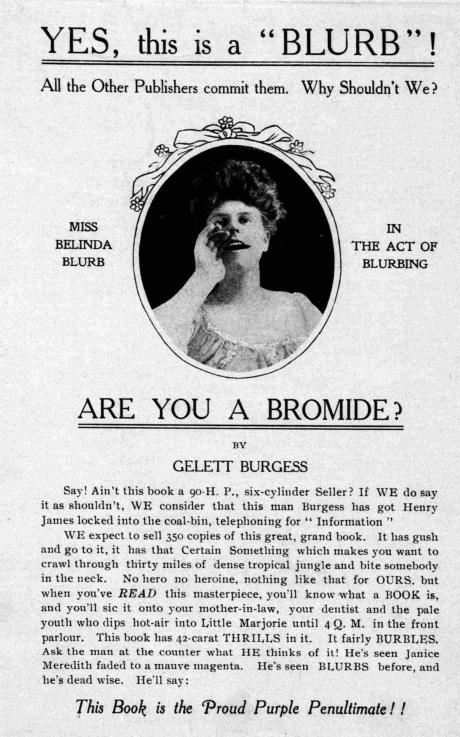Friday, February 11: Bandersnatches
A BOUQUET OF STORIES
by Steven Steinbock
Ever wonder where the word anthology came from? Oh come on, admit it. The question has been keeping you up on these cold winter nights. You came to the right place, for in this week’s Bandersnatch dispatch all will be revealed.
Sometime in the first century before the common era (that’s B.C. to the Christians among you) a fellow with the meager name of Meleager from the town of Gadara (in the north of Hellenized Judea) edited a collection of epigrams that was called Anthologia (The Garland) and is known today as The Garland of Meleager.
If it sounds like I’m you up for a shaggy-dog story, I assure you that this is all true. Antho really is Greek for “flower” and logos in this case derives from the verb legein, meaning “to gather.” Thus began a popular genre of Greek writing; collections of sayings, stories, poems, and other miscellanea.
And where would we be without them?
Blurb This
Today I was listening to a recording of Otto Penzler’s anthology of tennis-related crime stories, Murder is my Racket. It’s a good collection so far. I was a little put off, however, by the introduction, a substantial portion of which is given over to blurbs of the various contributors. Why Otto chose not to write simple bios of the writers, I can’t say. Rather than telling us about them, he simply quoted superlative-filled blurbs that various writers had written about each of the contributors.
It’s funny how blurb had become a verb in the publishing world.
I remember when my kindergarten class went to the school library, and the librarian explained to us parts of a book. She opened the book to the front inner dust jacket flap and said, “This is the blurb,” which she then went on to read to us.
At the time I thought it was a silly word. It turns out I was right. Blurb is a totally made-up nonsense word. In a column with the name “Bandersnatches” is seems appropriate that I should be blurbing the origin of this nonsense word:
In 1907, a special edition of Gelett Burgess’s book of humor Are You a Bromide? was released. On the jacket was a goofy photograph of a woman labeled “Miss Belinda Blurb” with the heading: YES, THIS IS A BLURB. The illustration even used the term “blurbing” as a verb and hinted that it was an act of self-promotion that “All the Other Publishers Commit.” Thus the word “blurb” was born.





















And right now I’m reading Burgess’ “Master Of Mysteries” anthology. It has a bio on the back cover which is kind of a modest blurb!
“I’ve never seen a purple cow/On that you may observe/But I can tell you anyhow/I’ve read a purple blurb!”
Steve:
Is there a word missing in the first sentence of the third paragraph?
SC
Very interesting! I was always taught your blurb is your hook but I guess it is easy to go overboard!
Yes SC there appears to be a word left out; hubs did not ask me to proofread the blurb blog prior.
Jeff: I’m not sure whether that’s serendipity or the alignment of the planets, but thank you for sharing that.
SC: Yes, that sentence should have read: “If it sounds like I’m SETTING you up for a shaggy-dog story. . .” Thanks for pointing out the omission.
I wonder if its not about time to do a column on Shabby Dog stories.
In that last comment, I meant SHAGGY dog stories. My typing fingers must be getting shabby.
You mean it was Scooby and Shag, and not Scoogy and Shab?
Steve:
As it happens, the origin of the shaggy dog story was my next question. Or rather, the origin of the name.
So, I would say that it is indeed time.
SC
Next time: The Shaggy Dog Story Unleashed.
I’ve been doing the research. Stay tuned.
Meanwhile, a little Scooby-snack for JLW: Scooby Doo does have interesting relevance to the genre, and a clever little connection to one of our own CB contributors. I’ll work that into a Bandersnatch column in the near future as well.